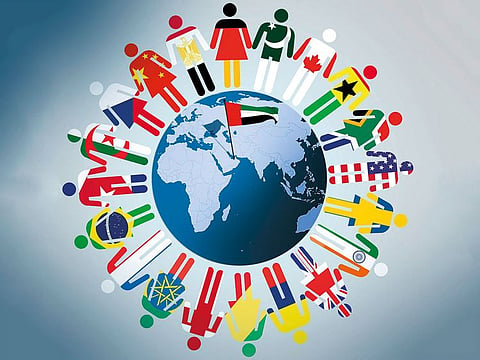The UAE’s melting pot of cultures serve it well
This is what will serve its economy through the many upswings and dips

We live in an angry world. From talk relating to trade wars to the ongoing phenomenon of fake news, the times we live in are characterised by negativity, an ethos that is defined by a culture that focuses on loss.
This is a different world to the one that prevailed in the 1990s, where the prevailing philosophy was that free trade helped to stop wars. So much were we in awe of technological progress sweeping the world that we overlooked the concerns of globalisation. Today, the pendulum has swung the other way, and each country has had to deal with its effects in the context of borders and national interest.
The other day, I read an article that stated global cities were increasingly starting to mimic each other in terms of their look and feel. While this may be true in terms of infrastructure, this ignores the underlying impulse that drives each of these global hotspots. In Dubai for instance, underneath the shadow of skyscrapers, we see a vibrant melting pot of multiculturalism, where each sub strata has expressed itself in its neighbourhoods.
From the South Asian diaspora to the Filipino milieu and to the European neighbourhoods in new Dubai, there are multiple forms of cultural expressions to be found, as an increasingly confident city and its local populace interact with the outside world. This is part of what Jane Jacobs described a “successful city” — a platform that created a multiplicity of choice.
This choice can only come within a framework that allows for increased interaction. It is somewhat ironical that in today’s age, it is the UAE that has been on the forefront of cultural integration, long considered a fundamental value of Western culture. Even as the rest of the world remains mired in the debate of nationalism and economic trade wars, the UAE continues to push through reforms that allow for greater multitudes of people to take advantage of its economic growth.
In doing so, it is promoting the fundamental roots of Arab culture, which is to be an open society, forever welcoming foreigners into its lands with the belief that only a cultural fusion can drive economic and social growth. When looked through this lens, Dubai and the UAE have become the new “melting pots” of global society, infusing optimism and creativity through its policies by creating a culture of growth.
At the intersection of arts and commerce lies a legal framework that allows for an open society to flourish. Here, the primacy of the value of tolerance and coexistence comes to the fore. And the recent initiatives of allowing for permanent residency inculcates a mechanism to achieve these rather lofty goals and strive towards accelerating contact with the rest of the world.
At this station of history, there is a recognition that the future is a common objective as well as a destination. Even as new shopping malls and skyscrapers sprout up, the legal framework allows for a culture of permanence, a sense of belonging, a sense of stability in increasingly turbulent times.
Business cycles may come and go with alarming frequency, but the impulse of reform has been driven by a culture of openness, one that reminds the rest of the world that the pendulum of reactionary rhetoric need not consume societies. Reforms, both economic, and social will drive this impulse to create a better future for all of us.
Dubai and the UAE has managed to create an atmosphere of inclusiveness, despite the regional and global geopolitical challenges that are omnipresent. With a small populace, it has created an economic and social miracle, defying the world that we live in, and inviting it to both witness and partake in its daring iconoclasm.
I have heard whispers of concerns regarding the deleterious impact that foreign influence would have on our culture. However, this misses the point.
What I see is a multitude of foreign companies and individuals flocking to the land of opportunity, to create an environment that is a win-win for all. Recent initiatives on immigration only serve to cement this outlook, and calls upon the world to do away with this angst filled rhetoric towards a more optimistic outlook.
This may sound cliched, but in the final analysis, every detailed examination of the country’s history leads to the same conclusion. In the years to come, I believe that this defining characteristic will distinguish this country from the rest of the world to an astonishing degree.
Nasser Malalla Ghanem is Senior Partner at the law firm of NM Associates, which has a joint venture with GCP.
Sign up for the Daily Briefing
Get the latest news and updates straight to your inbox



